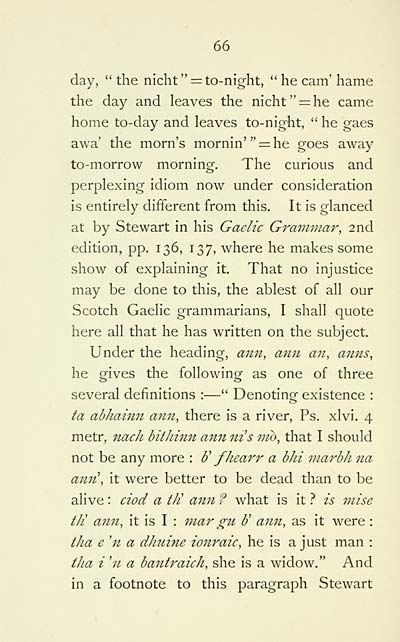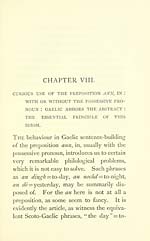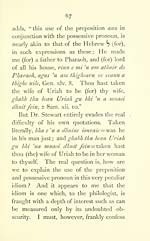Blair Collection > Vestigia celtica
(70)
Download files
Complete book:
Individual page:
Thumbnail gallery: Grid view | List view

66
day, " the nicht" = to-night, " he cam' hame
the day and leaves the nicht" = he came
home to-day and leaves to-night, " he gaes
awa the morn's mornin'" = he goes away
to-morrow morning. The curious and
perplexing idiom now under consideration
is entirely different from this. It is glanced
at by Stewart in his Gaelic Grammar, 2nd
edition, pp. 136, 137, where he makes some
show of explaining it. That no injustice
may be done to this, the ablest of all our
Scotch Gaelic grammarians, I shall quote
here all that he has written on the subject.
Under the heading, ami, ann an, aims,
he gives the following as one of three
several definitions : — " Denoting existence :
ta abhaimi ann, there is a river, Ps. xlvi. 4
metr, nach bithinn ann m's mo, that I should
not be any more : b' fhearr a bJii marbk na
ann\ it were better to be dead than to be
alive : ciod a tJi ann ? what is it ? is mise
tJi ann, it is I : mar gu U ami, as it were :
tha e'n a dhuine ionraic, he is a just man :
tha i 'n a ba^itraich, she is a widow." And
in a footnote to this paragraph Stewart
day, " the nicht" = to-night, " he cam' hame
the day and leaves the nicht" = he came
home to-day and leaves to-night, " he gaes
awa the morn's mornin'" = he goes away
to-morrow morning. The curious and
perplexing idiom now under consideration
is entirely different from this. It is glanced
at by Stewart in his Gaelic Grammar, 2nd
edition, pp. 136, 137, where he makes some
show of explaining it. That no injustice
may be done to this, the ablest of all our
Scotch Gaelic grammarians, I shall quote
here all that he has written on the subject.
Under the heading, ami, ann an, aims,
he gives the following as one of three
several definitions : — " Denoting existence :
ta abhaimi ann, there is a river, Ps. xlvi. 4
metr, nach bithinn ann m's mo, that I should
not be any more : b' fhearr a bJii marbk na
ann\ it were better to be dead than to be
alive : ciod a tJi ann ? what is it ? is mise
tJi ann, it is I : mar gu U ami, as it were :
tha e'n a dhuine ionraic, he is a just man :
tha i 'n a ba^itraich, she is a widow." And
in a footnote to this paragraph Stewart
Set display mode to: Large image | Transcription
Images and transcriptions on this page, including medium image downloads, may be used under the Creative Commons Attribution 4.0 International Licence unless otherwise stated. ![]()
| Early Gaelic Book Collections > Blair Collection > Vestigia celtica > (70) |
|---|
| Permanent URL | https://digital.nls.uk/75801185 |
|---|
| Description | Celtic footprints in philology ethics and religion. |
|---|---|
| Shelfmark | Blair.1 |
| Additional NLS resources: | |
| Attribution and copyright: |
|
| Description | A selection of books from a collection of more than 500 titles, mostly on religious and literary topics. Also includes some material dealing with other Celtic languages and societies. Collection created towards the end of the 19th century by Lady Evelyn Stewart Murray. |
|---|
| Description | Selected items from five 'Special and Named Printed Collections'. Includes books in Gaelic and other Celtic languages, works about the Gaels, their languages, literature, culture and history. |
|---|

